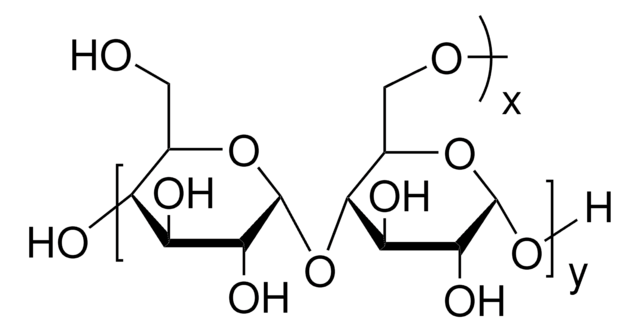69293
Sucralose
≥98.0% (HPLC)
Synonym(e):
1,6-Dichlor-1,6-dideoxy-β-D-fructofuranosyl-4-chlor-4-deoxy-α-D-galactopyranosid, E955, Trichlorsucrose
About This Item
Empfohlene Produkte
Assay
≥98.0% (HPLC)
Form
powder
Optische Aktivität
[α]/D 86.0±2.0°, c = 1 in H2O
Süße
600 × sucrose
Farbe
white to off-white
Nützlicher pH-Bereich
6-8 (20 °C, 100 g/L)
mp (Schmelzpunkt)
114.5 °C ((238.1 °F ) - OECD Test Guideline 102)
Löslichkeit
~300 g/L at 25 °C (77 °F)
SMILES String
OC[C@H]1O[C@H](O[C@]2(CCl)O[C@H](CCl)[C@@H](O)[C@@H]2O)[C@H](O)[C@@H](O)[C@H]1Cl
InChI
1S/C12H19Cl3O8/c13-1-4-7(17)10(20)12(3-14,22-4)23-11-9(19)8(18)6(15)5(2-16)21-11/h4-11,16-20H,1-3H2/t4-,5-,6+,7-,8+,9-,10+,11-,12+/m1/s1
InChIKey
BAQAVOSOZGMPRM-QBMZZYIRSA-N
Suchen Sie nach ähnlichen Produkten? Aufrufen Leitfaden zum Produktvergleich
Verwandte Kategorien
Anwendung
Biochem./physiol. Wirkung
Sonstige Hinweise
Lagerklassenschlüssel
11 - Combustible Solids
WGK
WGK 2
Flammpunkt (°F)
Not applicable
Flammpunkt (°C)
Not applicable
Persönliche Schutzausrüstung
Eyeshields, Gloves, type N95 (US)
Analysenzertifikate (COA)
Suchen Sie nach Analysenzertifikate (COA), indem Sie die Lot-/Chargennummer des Produkts eingeben. Lot- und Chargennummern sind auf dem Produktetikett hinter den Wörtern ‘Lot’ oder ‘Batch’ (Lot oder Charge) zu finden.
Besitzen Sie dieses Produkt bereits?
In der Dokumentenbibliothek finden Sie die Dokumentation zu den Produkten, die Sie kürzlich erworben haben.
Kunden haben sich ebenfalls angesehen
Unser Team von Wissenschaftlern verfügt über Erfahrung in allen Forschungsbereichen einschließlich Life Science, Materialwissenschaften, chemischer Synthese, Chromatographie, Analytik und vielen mehr..
Setzen Sie sich mit dem technischen Dienst in Verbindung.













